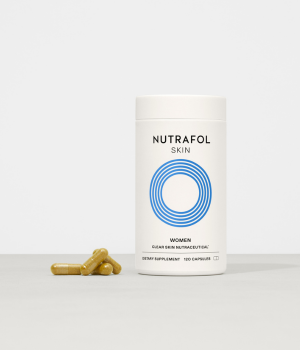BERBERINE
TYPE OF INGREDIENT
Antioxidant, anti-inflammatory
COMMONLY FOUND IN
Cleansers, serums, lotions
WHAT ARE THE BENEFITS OF BERBERINE ?
In addition to anti-diabetic activity, berberine has hydrating properties used for their anti-wrinkle, skin-lightening and anti-inflammatory activity. This function has made berberine an ingredient included in many cosmeceutical products. Berberine may be useful for vitiligo and malignant melanoma based on preliminary studies highlighting its effect on melanin synthesis in animal models. Berberine can increase glucagon-like peptide-1 (GLP-1) insulin secretion in the intestine. Insulin is a hormone that helps regulate blood glucose levels by signaling cells to absorb glucose from blood. Elevated insulin can promote androgen synthesis, resulting in excess sebum production, a known correlates of acne severity.
WHAT IS BERBERINE?
Berberine is a derivative of the plant Berberis vulgaris, a shrub with purported medicinal properties. Berberine is an isoquinoline alkaloid with anti-inflammatory, antioxidant, antibacterial and antimicrobial properties.
IS BERBERINE SAFE FOR ALL SKIN TYPES AND TONES?
Berberine is considered safe for short-term application on the skin for all skin types and tones based on available evidence.
CONTRAINDICATIONS
The available evidence does not suggest any contraindications for berberine, but individuals with an adverse reaction to it should avoid products containing berberine.
Sources:
Dulić M, Ciganović P, Vujić L, Zovko Končić M. Antidiabetic and Cosmeceutical Potential of Common Barbery (Berberis vulgaris L.) Root Bark Extracts Obtained by Optimization of ‘Green’ Ultrasound-Assisted Extraction. Molecules. 2019;24(19):3613. Published 2019 Oct 8.
Lee Y, Liu L, Yi Y. Inhibitory effect of berberine from Coptidis rhizoma on melanin synthesis of murine malignant melanoma. Pharmazie. 2018;73(5):300-303.
MIR-PALOMO S, NÁCHER A, OFELIA VILA BUSÓ MA, ET AL. BAICALIN AND BERBERINE ULTRADEFORMABLE VESICLES AS POTENTIAL ADJUVANT IN VITILIGO THERAPY. COLLOIDS SURF B BIOINTERFACES. 2019;175:654-662.


